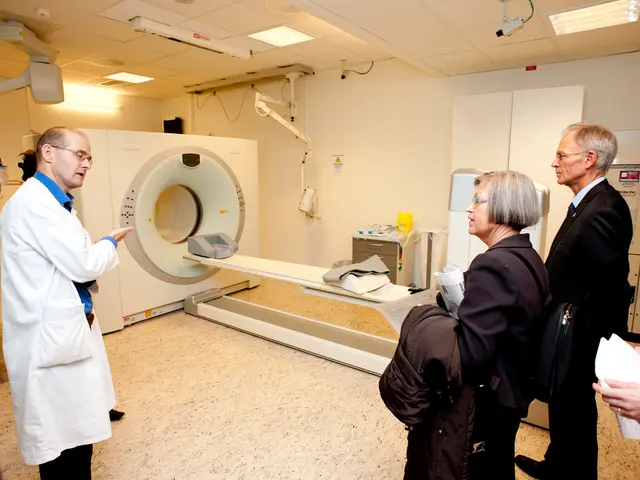Aging Gracefully: The Role of Flavonoids in Healthier Aging
Consuming More Berries and Flavanoids May Contribute to Healthy Aging Process
Living longer is becoming the norm, and with that comes a greater focus on healthy aging. One facet that can contribute to this is diet, particularly foods rich in flavonoids. Recent research shows that upping your intake of these powerhouse nutrients might help lower the risk of certain elements of unhealthy aging, like frailty and poor mental health.
As the world's population continues to age, researchers and healthcare professionals are striving to find ways to ensure people live longer, healthier lives. Nicola Bondonno, PhD, a post-doctoral researcher at the Danish Cancer Institute in Copenhagen, Denmark, is one of them. Her new study, published in The American Journal of Clinical Nutrition, finds that consuming more flavonoid-packed foods and beverages may help reduce the risk of specific aspects of unhealthy aging.
What are Flavonoids?
Flavonoids are found in a broad range of fruits, vegetables, and plant-based foods. Some of the most common sources are berries (like blueberries and raspberries), citrus fruits (such as oranges and grapefruit), dark chocolate, fruits (like peaches and bananas), green and black tea, leafy greens (such as kale and spinach), red wine, and vegetables (such as peas, onions, and tomatoes). Flavonoids not only give many plants their vibrant colors, but they also seem to have health-promoting properties.
"They may protect against chronic diseases," Bondonno explains. "Flavonoids have anti-inflammatory and antioxidant properties, which help protect the body's cells from damage as we age. They also support blood vessel health and may help preserve muscle and brain function."
Flavonoids and Healthy Aging
In her study, Bondonno and her team analyzed health data from over 85,000 participants aged 60 and older. They found that female participants with the highest flavonoid intake had a 15% lower risk of frailty, a 12% reduced chance of impaired physical function, and a 12% lower risk of poor mental health. While male participants experienced a lesser, but still significant 15% decrease in their risk of poor mental health, they did not see the same benefits regarding lowering frailty or impaired physical function risks.
"It's possible that the difference we saw between men and women has more to do with how the study was structured than a true biological difference," Bondonno explains. "More research is needed to understand whether men and women truly respond differently to flavonoids."
Nonetheless, Bondonno encourages people to consider increasing their flavonoid intake through dietary changes. "These findings suggest that diets rich in flavonoid-containing foods may help older women maintain strength and mobility as they age," she said. "Even modest improvements like these can make a real difference in someone's ability to live well into older age."
Diet: A Powerful Tool for Healthy Aging
Manisha Parulekar, MD, FACP, AGSF, CMD, director of the Division of Geriatrics at Hackensack University Medical Center and co-director of the Center for Memory Loss and Brain Health at Hackensack University Medical Center in New Jersey, agrees. "Flavonoids are potent antioxidants and have anti-inflammatory effects," she says. "Oxidative stress and chronic inflammation are considered key drivers of aging and age-related diseases. By potentially slowing down these processes, flavonoids could theoretically slow down negative aspects of aging."
Parulekar further explains the health benefits of flavonoids, citing their links to improved cardiovascular health, lower blood pressure, better cholesterol levels, and better endothelial function. Since cardiovascular health is crucial for overall health and longevity, this connection supports the idea of flavonoids promoting healthy aging.
Active Approach to Wellness
Lifestyle modifications to improve the aging process through diet offer a proactive, accessible, and potentially transformative approach to promoting healthy longevity for everyone. "Focusing on diet promotes a more holistic approach to health, addressing the root causes of aging-related decline rather than just treating symptoms," Parulekar said. "Dietary changes often have positive ripple effects on other aspects of health, such as weight management, energy levels, and mood."
Incorporating More Flavonoids into Your Diet
For those interested in incorporating more flavonoids into their diets, Monique Richard, MS, RDN, LDN, a registered dietitian nutritionist and owner of Nutrition-In-Sight, offers some practical advice.
"Flavonoids, including the six subtypes related to dietary sources - anthocyanidins, flavan-3-ols, flavonols, flavones, flavanones, and isoflavones - have been attributed to protecting cell degradation from oxidative stress and free radicals, as well as being anti-inflammatory due to their concentrated antioxidant levels," Richard explains. "They also can act as a chelator (binder) to oxidizing effects of metal ions like zinc, iron, and copper."
Richard encourages readers to think of incorporating flavonoids as adding some "flare" to their daily foods for increased health benefits. "Sample diets featuring three servings of flavonol-rich foods a day might include the following," she suggests.
- Breakfast: A cup of green tea or a smoothie with berries
- Lunch: A lean protein atop a salad with kale, apples, walnuts, Gorgonzola, and balsamic vinegar and olive oil dressing (with chives and garlic)
- Dinner: 4 ounces of fatty cold water fish (such as salmon or tilapia), topped with a strawberry salsa, 3/4 cup roasted sweet potatoes and 2/3 cup long grain rice, 2 ounces dark chocolate, and 5 ounces red wine or grape juice
By taking a proactive approach to their diets, individuals can enjoy the numerous health benefits associated with flavonoids and potentially delay negative aspects of aging.
- As more people embrace longevity, nutrition plays a significant role, particularly in diets rich in flavonoids, found in fruits, vegetables, and plant-based foods.
- A study by Nicola Bondonno, PhD, discovered that increased flavonoid intake might lower the risk of frailty, impaired physical function, and poor mental health in seniors, particularly among women.
- Flavonoids offer various health benefits, such as reducing chronic diseases, aiding blood vessel health, and preserving muscle and brain function due to their anti-inflammatory and antioxidant properties.
- Manisha Parulekar, MD, supports the idea that flavonoids could slow down negative aspects of aging by potentially slowing down oxidative stress and chronic inflammation.
- Lifestyle modifications like increasing flavonoid intake can promote a holistic approach to health, addressing root causes of aging-related decline and positively impacting other health aspects like weight management, energy levels, and mood.
- To incorporate more flavonoids into your diet, consider adding green tea or berries to breakfast, lean protein with kale, apples, and walnuts for lunch, and fatty cold water fish with a strawberry salsa for dinner.
- Medicare may cover therapies and treatments that contribute to healthy aging, making it essential for seniors to understand their health benefits and plan accordingly.
- A focus on both diet and fitness can significantly enhance skin care and maintaining a youthful appearance as part of the journey toward healthier and longer life for both men and women.








